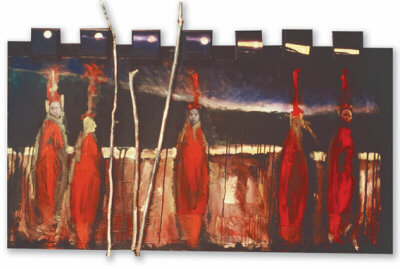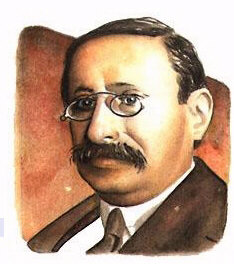 May 06
May 06
France’s Jewish Prophets: Alain Finkielkraut, Albert Memmi, and the Looming Crisis of Liberalism
by Dr. Michael Shurkin
p. 3 of 3
From Léon Blum to Pym Fortuyn
Where does all this leave the tradition of the French-Jewish intellectual?
First, it is clear that Finkielkraut's racism, if it can be called that, is obviously not that of the blood and soil nativist, but that of the Enlightenment universalist troubled by another’s perceived particularism. In a sense, this view places him firmly in a troubling French tradition that traces back to Voltaire’s Essai sur les mœurs. The basic idea is that a people who resist or combat the general trend toward a universal culture of reason and civilization by clinging to – or worse, imposing on others – their own particularist (and presumably atavistic) culture are, in effect, “bad” and appropriate objects of intolerance or even coercion. Whether or not this “intolerance of the Left” – in the sense that it is grounded in French Revolutionary traditions rather than Counter-Revolutionary or simply xenophobic ones – is better than “intolerance of the Right” is debatable.
Second, Finkielkraut, notwithstanding these ties to an older French tradition, was clearly running against the current of the liberal consensus that, in sharp contrast to that of the United States, has a hegemonic hold over public  debate. Except for Finkielkraut and his few (and almost entirely Jewish) defenders, no one seriously doubted any of the clichés regarded by most as self-evident: specifically, that the rioters are “poorly socialized” and “marginalized” victims of racism and “arabo-phobia,” all of which make the violence understandable and excusable. Indeed, the prevailing logic – whether in the pages of France’s leading newspapers or on the floor of the National Assembly – was little different from Alvy Singer’s father’s defense of a maid’s theft of silverware in Woody Allen’s Annie Hall, “She's a colored woman, from Harlem! She has no money! She's got a right to steal from us! After all, who is she gonna steal from if not us?”
debate. Except for Finkielkraut and his few (and almost entirely Jewish) defenders, no one seriously doubted any of the clichés regarded by most as self-evident: specifically, that the rioters are “poorly socialized” and “marginalized” victims of racism and “arabo-phobia,” all of which make the violence understandable and excusable. Indeed, the prevailing logic – whether in the pages of France’s leading newspapers or on the floor of the National Assembly – was little different from Alvy Singer’s father’s defense of a maid’s theft of silverware in Woody Allen’s Annie Hall, “She's a colored woman, from Harlem! She has no money! She's got a right to steal from us! After all, who is she gonna steal from if not us?”
Third, in this departure from the prevailing consensus, Memmi and Finkielkraut are, paradoxically, upholding the tradition of France’s Jewish intellectuals, who as a group distinguish themselves by taking stands that are contrary to the French consensus. Today, that means being to the Right of center, all the while reinforcing their commitment to certain essential Enlightenment and French Republican values. That commitment is as old as the Revolution itself. But the rightward shift away from total universalism – the argument that perhaps some people are too different to be absorbed by France’s civilization and its capacity to emancipate men and women from their atavistic particularisms - is very new. In fact, given the political and intellectual commitments of post-1789 French Jewry, it borders on heresy.
With very few exceptions, French Jews have always staked their destiny on France’s commitment to liberalism, and a vision of France that identifies it with Enlightenment universalism. To defend that France – for there have always been competing visions – they have historically rallied from the center to the left of the political spectrum, from the classical liberalism of the 1830s to various forms of Socialism, and in all cases they understood their particular political tendency to be the best expression of France’s universalizing civilization. With regard to Muslims and colonialism, therefore, it is no accident that France’s three great Jewish statesmen, Adolphe Crémieux, Léon Blum, and Pierre Mendes-France, distinguished themselves by their efforts to square colonialism with liberal values and make French rule in North Africa as liberal, tolerant, and magnanimous as possible. Crémieux at the beginning of colonization in the 1840s was the first to recognize that Jewish emancipation itself was threatened by the prevalent view that Algeria’s indigenous peoples were too different to be made French, and he was one of the early leaders of the fight against militarism and populist racism that flourished in Algeria. Blum in the 1930s and Mendes-France in the 1950s likewise did what they could to make colonial Algeria liberal. They appear earnestly to have believed that Algerian Muslims would renounce their nationalist ambitions and embrace France if France granted them greater political liberties, and both men authored generous reformist legislation.
 Indeed, for French Jews, faith in humanity’s potential and man’s perfectibility through Enlightenment has always been dogma. Perhaps no better example exists than Léon Blum, who appears never to have noticed the vociferous antisemitic libels made almost daily against him, and who spent his years in a Nazi concentration camp translating Goethe and meditating on the glories of humanity. After liberation he took up the pen to defend his German captors, and he petitioned Charles De Gaulle to spare the lives of Philippe Pétain and the Vichy Prime Minister, Pierre Laval (De Gaulle commuted Pétain’s death sentence but sensibly had Laval shot).
Indeed, for French Jews, faith in humanity’s potential and man’s perfectibility through Enlightenment has always been dogma. Perhaps no better example exists than Léon Blum, who appears never to have noticed the vociferous antisemitic libels made almost daily against him, and who spent his years in a Nazi concentration camp translating Goethe and meditating on the glories of humanity. After liberation he took up the pen to defend his German captors, and he petitioned Charles De Gaulle to spare the lives of Philippe Pétain and the Vichy Prime Minister, Pierre Laval (De Gaulle commuted Pétain’s death sentence but sensibly had Laval shot).
Albert Memmi and Alain Finkielkraut would insist that they have betrayed neither Blum’s humanism nor the idea of France Crémieux, Blum, and Mendes-France held so dear. They claim, rather, to be realists offering a sober assessment to threats against their liberal France. Of course, whether they are on the correct side of the immigration issue, or any other one for that matter, is debatable. But is their France still liberal – is their Enlightenment still universal – if they believe not just that French lumières can’t penetrate certain corners but that those corners menace the rest of France with darkness? For better or for worse, Memmi and Finkielkraut have hit upon one of the dilemmas that will define this new century -- within France and beyond it.
Lower image: Leon Blum
Dr. Michael Shurkin is a contributing editor to Zeek Magazine and writes frequently regarding French culture and history.









